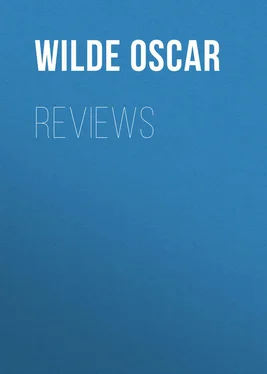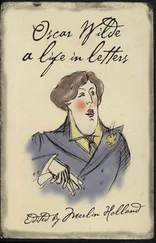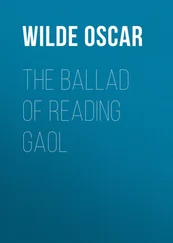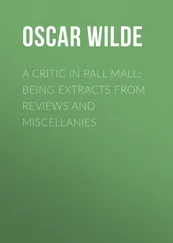Oscar Wilde - Reviews
Здесь есть возможность читать онлайн «Oscar Wilde - Reviews» — ознакомительный отрывок электронной книги совершенно бесплатно, а после прочтения отрывка купить полную версию. В некоторых случаях можно слушать аудио, скачать через торрент в формате fb2 и присутствует краткое содержание. Жанр: foreign_home, literature_19, cinema_theatre, foreign_prose, на английском языке. Описание произведения, (предисловие) а так же отзывы посетителей доступны на портале библиотеки ЛибКат.
- Название:Reviews
- Автор:
- Жанр:
- Год:неизвестен
- ISBN:нет данных
- Рейтинг книги:3 / 5. Голосов: 1
-
Избранное:Добавить в избранное
- Отзывы:
-
Ваша оценка:
- 60
- 1
- 2
- 3
- 4
- 5
Reviews: краткое содержание, описание и аннотация
Предлагаем к чтению аннотацию, описание, краткое содержание или предисловие (зависит от того, что написал сам автор книги «Reviews»). Если вы не нашли необходимую информацию о книге — напишите в комментариях, мы постараемся отыскать её.
Reviews — читать онлайн ознакомительный отрывок
Ниже представлен текст книги, разбитый по страницам. Система сохранения места последней прочитанной страницы, позволяет с удобством читать онлайн бесплатно книгу «Reviews», без необходимости каждый раз заново искать на чём Вы остановились. Поставьте закладку, и сможете в любой момент перейти на страницу, на которой закончили чтение.
Интервал:
Закладка:
(1) ’Twixt Love and Duty : A Novel . By Tighe Hopkins. (Chatto and Windus.)
(2) Jenny Jennet : A Tale Without a Murder . By A. Gallenga. (Chapman and Hall.)
(3) A Life’s Mistake : A Novel . By Mrs. H. Lovett Cameron. (Ward and Downey.)
(4) J. S .; or , Trivialities : A Novel . By Edward Oliver Pleydell-Bouverie. (Griffith, Farren and Co.)
(5) All But : A Chronicle of Laxenford Life . By Pen Oliver, F.R.C.S. (Kegan Paul.)
A LITERARY PILGRIM
( Pall Mall Gazette , April 17, 1886.)
Antiquarian books, as a rule, are extremely dull reading. They give us facts without form, science without style, and learning without life. An exception, however, must be made for M. Gaston Boissier’s Promenades Archéologiques . M. Boissier is a most pleasant and picturesque writer, and is really able to give his readers useful information without ever boring them, an accomplishment which is entirely unknown in Germany, and in England is extremely rare.
The first essay in his book is on the probable site of Horace’s country-house, a subject that has interested many scholars from the Renaissance down to our own day. M. Boissier, following the investigations of Signor Rosa, places it on a little hill over-looking the Licenza, and his theory has a great deal to recommend it. The plough still turns up on the spot the bricks and tiles of an old Roman villa; a spring of clear water, like that of which the poet so often sang, ‘breaks babbling from the hollow rock,’ and is still called by the peasants Fonte dell ’ Oratini , some faint echo possibly of the singer’s name; the view from the hill is just what is described in the epistles, ‘Continui montes nisi dissocientur opaca valle’; hard by is the site of the ruined temple of Vacuna, where Horace tells us he wrote one of his poems, and the local rustics still go to Varia (Vicovaro) on market days as they used to do when the graceful Roman lyrist sauntered through his vines and played at being a country gentleman.
M. Boissier, however, is not content merely with identifying the poet’s house; he also warmly defends him from the charge that has been brought against him of servility in accepting it. He points out that it was only after the invention of printing that literature became a money-making profession, and that, as there was no copyright law at Rome to prevent books being pirated, patrons had to take the place that publishers hold, or should hold, nowadays. The Roman patron, in fact, kept the Roman poet alive, and we fancy that many of our modern bards rather regret the old system. Better, surely, the humiliation of the sportula than the indignity of a bill for printing! Better to accept a country-house as a gift than to be in debt to one’s landlady! On the whole, the patron was an excellent institution, if not for poetry at least for the poets; and though he had to be propitiated by panegyrics, still are we not told by our most shining lights that the subject is of no importance in a work of art? M. Boissier need not apologise for Horace: every poet longs for a Mæcenas.
An essay on the Etruscan tombs at Corneto follows, and the remainder of the volume is taken up by a most fascinating article called Le Pays de l’Enéide . M. Boissier claims for Virgil’s descriptions of scenery an absolute fidelity of detail. ‘Les poètes anciens,’ he says, ‘ont le goût de la précision et de la fidélité: ils n’imaginent guère de paysages en l’air,’ and with this view he visited every place in Italy and Sicily that Virgil has mentioned. Sometimes, it is true, modern civilisation, or modern barbarism, has completely altered the aspect of the scene; the ‘desolate shore of Drepanum,’ for instance (‘Drepani illætabilis ora’) is now covered with thriving manufactories and stucco villas, and the ‘bird-haunted forest’ through which the Tiber flowed into the sea has long ago disappeared. Still, on the whole, the general character of the Italian landscape is unchanged, and M. Boissier’s researches show very clearly how personal and how vivid were Virgil’s impressions of nature. The subject is, of course, a most interesting one, and those who love to make pilgrimages without stirring from home cannot do better than spend three shillings on the French Academician’s Promenades Archéologiques.
Nouvelles Promenades Archéologiques , Horace et Virgile . By Gaston Boissier. (Hachette.)
BÉRANGER IN ENGLAND
( Pall Mall Gazette , April 21, 1886.)
A philosophic politician once remarked that the best possible form of government is an absolute monarchy tempered by street ballads. Without at all agreeing with this aphorism we still cannot but regret that the new democracy does not use poetry as a means for the expression of political opinion. The Socialists, it is true, have been heard singing the later poems of Mr. William Morris, but the street ballad is really dead in England. The fact is that most modern poetry is so artificial in its form, so individual in its essence and so literary in its style, that the people as a body are little moved by it, and when they have grievances against the capitalist or the aristocrat they prefer strikes to sonnets and rioting to rondels.
Possibly, Mr. William Toynbee’s pleasant little volume of translations from Béranger may be the herald of a new school. Béranger had all the qualifications for a popular poet. He wrote to be sung more than to be read; he preferred the Pont Neuf to Parnassus; he was patriotic as well as romantic, and humorous as well as humane. Translations of poetry as a rule are merely misrepresentations, but the muse of Béranger is so simple and naïve that she can wear our English dress with ease and grace, and Mr. Toynbee has kept much of the mirth and music of the original. Here and there, undoubtedly, the translation could be improved upon; ‘rapiers’ for instance is an abominable rhyme to ‘forefathers’; ‘the hated arms of Albion’ in the same poem is a very feeble rendering of ‘le léopard de l’Anglais,’ and such a verse as
’Mid France’s miracles of art,
Rare trophies won from art’s own land,
I’ve lived to see with burning heart
The fog-bred poor triumphant stand,
reproduces very inadequately the charm of the original:
Dans nos palais, où, près de la victoire,
Brillaient les arts, doux fruits des beaux climats,
J’ai vu du Nord les peuplades sans gloire,
De leurs manteaux secouer les frîmas.
On the whole, however, Mr. Toynbee’s work is good; Les Champs , for example, is very well translated, and so are the two delightful poems Rosette and Ma République ; and there is a good deal of spirit in Le Marquis de Carabas :
Whom have we here in conqueror’s rôle?
Our grand old Marquis, bless his soul!
Whose grand old charger (mark his bone!)
Has borne him back to claim his own.
Note, if you please, the grand old style
In which he nears his grand old pile;
With what an air of grand old state
He waves that blade immaculate!
Hats off, hats off, for my lord to pass,
The grand old Marquis of Carabas! —
though ‘that blade immaculate’ has hardly got the sting of ‘un sabre innocent’; and in the fourth verse of the same poem, ‘Marquise, you’ll have the bed-chamber’ does not very clearly convey the sense of the line ‘La Marquise a le tabouret.’ The best translation in the book is The Court Suit (L’Habit de Cour), and if Mr. Toynbee will give us some more work as clever as this we shall be glad to see a second volume from his pen. Béranger is not nearly well enough known in England, and though it is always better to read a poet in the original, still translations have their value as echoes have their music.
Читать дальшеИнтервал:
Закладка:
Похожие книги на «Reviews»
Представляем Вашему вниманию похожие книги на «Reviews» списком для выбора. Мы отобрали схожую по названию и смыслу литературу в надежде предоставить читателям больше вариантов отыскать новые, интересные, ещё непрочитанные произведения.
Обсуждение, отзывы о книге «Reviews» и просто собственные мнения читателей. Оставьте ваши комментарии, напишите, что Вы думаете о произведении, его смысле или главных героях. Укажите что конкретно понравилось, а что нет, и почему Вы так считаете.












